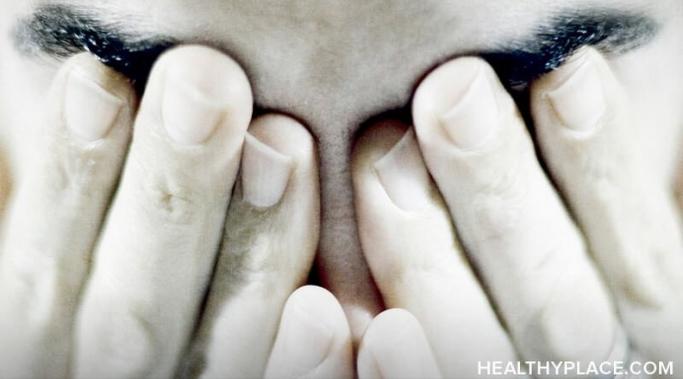My experience with eye movement desensitization and reprocessing therapy started when eye movement desensitization and reprocessing (EMDR) was suggested to me as treatment for my posttraumatic stress disorder (PTSD) and I thought the process sounded like some crazy science fiction stuff from a movie set far into the future. I was supposed to watch some lights going back and forth while holding vibrating tactile devices and listening to ambient sounds, both of which alternated from right to left? What? And that was going to somehow, magically maybe, move my traumatic memories to some other part of my brain where they wouldn't be so intrusive and emotion-provoking? That sounds as crazy as I was feeling at the time, but I was desperate for relief from my PTSD symptoms and willing to try anything so I tried the PTSD treatment of EMDR therapy.
Trauma! A PTSD Blog
Eye movement desensitization and reprocessing (EMDR) therapy is a posttraumatic stress disorder treatment. Treatment for posttraumatic stress disorder (PTSD) can be as varied as the types of trauma that causes it, and what works for one person may not be what works for another. In my experience with PTSD recovery, I found relief from my symptoms with eye movement desensitization and reprocessing (EMDR) therapy. EMDR is a powerful and effective PTSD therapy that helps the brain to reprocess past traumas differently, relieving the PTSD sufferer from often debilitating symptoms like flashbacks, nightmares and panic attacks.
Avoidance is common in posttraumatic stress disorder (PTSD) sufferers when triggered. Wanting to hide or run away from certain situations or avoiding negative emotions that come up is almost automatic for me when I'm dealing with PTSD symptoms. PTSD Symptom avoidance, especially emotional, may work to alleviate feelings of anxiety and panic for the short-term, but in the long run, avoidance can worsen PTSD symptoms and make life more difficult.
The anniversary of a traumatic event can send those of us with posttraumatic stress disorder (PTSD) into a tailspin, bringing up negative emotions and PTSD symptoms more than usual. Coping with these feelings and reactions can seem overwhelming, frustrating and even useless, but I have found that there are ways of managing them when that time of year rolls around. Trauma anniversaries can be an opportunity for growth and healing if you allow them to be.
Sometimes saying goodbye is a part of posttraumatic stress disorder recovery. A good friend used to end his emails with, “Nothing lasts. Everything changes.” That has proven true in my recovery from posttraumatic stress disorder (PTSD). I will be headed in one direction, and then life will take an unexpected turn. Sometimes, saying goodbye must be a part of PTSD recovery.
An important element of posttraumatic stress disorder (PTSD) recovery is to ask for help; but that didn’t come naturally for me (Are You Afraid To Ask For Mental Health Help?). My PTSD was caused by domestic violence while I was growing up in an alcoholic household. I learned at an early age to never ask for help and I had to overcome that learned behavior in order to recover. In my PTSD recovery, I had to learn to ask for help.
Finding out that you have posttraumatic stress disorder (PTSD) can be something that is hard to deal with and accepting your PTSD diagnosis is hard, too. It may be, quite simply, a diagnosis that you don't want to hear. However, I have learned that accepting my PTSD diagnosis has made living with PTSD much easier. There is a freedom and a positive side to life after I accepted my PTSD diagnosis and even learned to embrace it.
It takes a lot of courage to confront posttraumatic stress disorder (PTSD). When my PTSD symptoms flare up, I feel weak and unable to cope, but I keep going – by moving forward to make my life better. I exhibit courage when confronting PTSD -- more than I could acknowledge for many years.
It can be frustrating learning how to cope with triggers from posttraumatic stress disorder (PTSD). Triggers seem to be all around, yet it often feels like they have come out of the blue when they hit. Because so many different things have the potential to be a PTSD trigger, it may seem like an impossible task to prepare for them before they occur (When My PTSD Gets Triggered). The good news is, there are some effective coping strategies that can help deal with triggers during PTSD recovery when they do come up.
Making the decision to take psychiatric medication to treat posttraumatic stress disorder (PTSD) can be difficult. Even though PTSD is most commonly (and successfully) treated with a combination of therapy and medication, some of us are reluctant to take psychiatric medication as part of our recovery. There are many valid reasons for and against using medication as treatment for PTSD, and careful consideration and education are needed to weed through them. Talking to your psychiatrist openly and honestly is important in making the decision whether or not to use psychiatric medications as part of your PTSD recovery.









